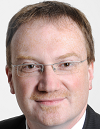18th Karlsruhe Dialogues – Speakers
Prof. Dr. Lars P. Feld
Speaker

Prof. Dr. Lars P. Feld (born in 1966, married with three children) has been professor of eco-nomics – in particular of economic politics and Ordnungsökonomik (‘order economics’) – at the Albert Ludwig University of Freiburg and director of the Walter Eucken Institute. He is also permanent visiting professor at the Centre for European Economic Research (ZEW) in Mannheim, a member of the German Council of Economic Experts, a member of the inde-pendent advisory board of the German Stability Council, a member of the Scientific Advisory Committee of the German Federal Ministry of Finance, spokesperson for the Kronberger Sci-entific Council (at the Market Economy Foundation), full member of the German Academy of Sciences Leopoldina (German National Academy of Sciences), as well as member of the Mont Pèlerin Society.
After studying economics at Saarland University, Feld earned his doctorate at the University of St. Gallen in 1999, and received his habilitation there in 2002. He was professor of eco-nomics – in particular public finance – at the Philipp University of Marburg from 2002 to 2006 and at Heidelberg University from 2006 to 2010. In 2007 he was appointed as an expert to the joint Bundestag-Bundesrat Commission on the Modernisation of Financial Relations among the Federal Länder (Federalism Commission II), where he advised on the new German ‘debt brake’. From 2005 to 2012 he was the chief editor of Perspektiven der Wirtschaftspolitik (Perspectives of Economic Policy), and from 2007 to 2009 he was president of the European Public Choice Society.
In the summer of 2013, the Frankfurter Allgemeine Zeitung included him in a ranking of the most influential German economists. His research interests lie in various domains of finance and economic policy, the new political economy, and the economic analysis of law.
Statements
1. Does the world market society promote or obstruct the achievement of global humanitarian living conditions?
Participation in the international division of labour promotes human rights standards as well as social and environmental standards. Globalisation fosters peace.
2. How much privacy do we have left between government surveillance and commercial data collection, and what is that privacy worth to us?
Safeguarding the civil rights and liberties of the individual is the central task of the coming years. As has become clear through the NSA scandal, existing negative developments should be rectified by legislation within individual countries – the USA in particular, here.
3. Has the world market society led to new forms of human trafficking, or does it instead represent an opportunity to implement international standards for decent and humane labour conditions?
The world market society primarily represents an opportunity to implement international social and environmental standards. People in the various countries of the world have never known so much about one another, and have never been so interested in one another. The pressure to eliminate inhumane conditions and to meet the standards that exist in the industrialised nations has increased.
